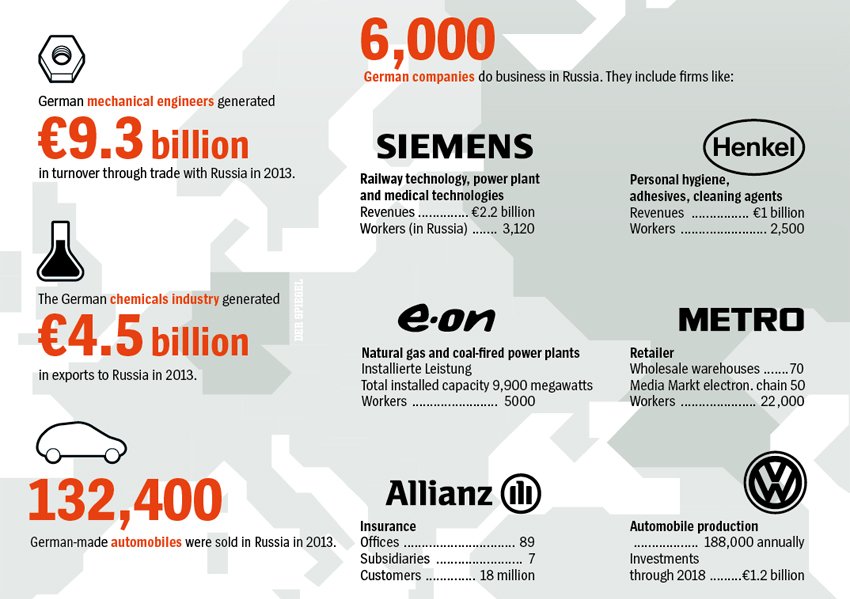– German Executives Denounce EU/US Leaders Over Russia Confrontation (ZeroHedge, March 30, 2014):
With at least 300,000 German jobs dependent on business relations with Russia, it is hardly surprising that, as Reuters reports, several top German executives have criticized the strategy of the U.S. and Europe in dealing with Russia fearing the consequences for their businesses. On the heels of Siemens CEO’s comments (as we noted here) that “you don’t want to sanction anyone you depend on,” a number of other senior German executives have commented that that great change could be achieved if the West cooperated with Russia rather than being confrontational. Deutsche Post’s Appel summed it up, “Since we don’t have major sources of raw materials in Europe, we will always be dependent on others… and it seems questionable to me whether dependence on the Middle East or Venezuela would be better than that on Russia.”
Russia is Germany’s 11th biggest commercial partner, with trade reaching 76.5 billion euros ($105 billion) last year, according to the trade association Ost Ausschuss.
Many companies are worried about losing out on business if further sanctions take effect. Some 300,000 German jobs are linked to business there and Europe’s biggest economy depends on Russia for 35 percent of its gas.
But more executives are concerned that the West’s confrontations with Putin will have unintended consequences…
Steelmaker ThyssenKrupp’s Chief Executive Heinrich Hiesinger told daily newspaper Die Welt that the events of the past had shown that great change could be achieved if the West cooperated with Russia rather than being confrontational.
“Now we have a situation in which Russia feels that its back is against the wall,” he said in an article published on the paper’s website on Saturday.
…
“Many German companies that invested in Russia last year or wanted to build production sites there have now given up their plans or put them on ice,” Bernd Hones, Economic Correspondent at economic development agency Germany Trade & Invest in Moscow, told weekly paper Frankfurter Allgemeine Sonntagszeitung.
He added that German corporations had the impression that Russian industrial firms did not think it politically appropriate to do business with German companies.
…
Some non-industrial German companies, such as retailer Metro and drugmaker Stada have said they would continue to invest in Russia as long as threatened G7 sanctions do not disrupt business.
Herbert Hainer, chief executive of sporting goods maker Adidas, told Die Welt that he believed the West waited too long to start talks with Putin when tensions between Russia and Ukraine rose.
“We should ask ourselves if someone like Putin shouldn’t have been part of the process much earlier, instead of holding off with talks until it’s too late,” he said.
…
Eckhard Cordes, head of Germany’s Committee on Eastern European Economic Relations, warned that some trade with Russia could shift to China if Europe turned its back on Russian gas.
“Russia would find new sales markets in China if Europe limited its energy imports,” he told Frankfurter Allgemeine Sonntagszeitung, adding such a development could not be in Europe’s interest.
But German politicians are not amused…
Siemens CEO Joe Kaeser acted “a bit off-key” by meeting Putin in Moscow on March 26 to discuss business ties, ARD television quotes Economy and Energy Minister Sigmar Gabriel as saying in interview today.
…
Gabriel added that they must avoid impression that European values, including inviolability of borders, are for sale
But perhaps they should listen to Deutsche Post’s CEO’s comments:
“Since we don’t have major sources of raw materials in Europe, we will always be dependent on others,” Appel said.
“And it seems questionable to me whether dependence on the Middle East or Venezuela would be better than that on Russia.”


The movement against the US continues. Even the UK has spoken out against the US in this Russian nonsense. The EU exports E120 Billion in goods to Russia every year, and Russia provides much of their energy needs. Nobody is going to cut off a good customer and trading partner on a whim of the childish US.
This was 100% predictable. Why can’t US leaders see it if I can?